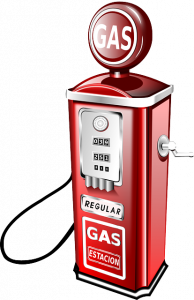Why another fuel log application?
The impetus for the application started when we have been involved in a discussion about the fuel card frauds with a large fuel card company. The convenience of the fuel card is overshadowed by the users who are using it for their personal use; businesses are trying to curb the habit but there is not easy with a fleet of different vehicles having different utilization – a vehicle loaded has a total different fuel consumption than one running with no load, a light truck has a different fuel consumption profile than a long haul truck, etc…
When a driver refuels, she is asked to fill-up a form where several data points are required:
- automatically the GPS location is detected, the address is generated and added to the record along with the date&time of the transaction
- the price/liter or price/gallon has to be manually entered
- the total price for fuel has to be manually entered
- A picture of the receipt displaying the date&time, the address and information about the fuel price and quantity has to be taken. Here the information has to be the same as the one collected by the GPS data (regarding the location and date&time). Also, the information has to be the same as the one entered manually about the fuel price per unit and total amount spent on fuel.
- A picture of the odometer has to be taken. The odometer value on the form has to coincide with the one visible in the image.
The application enforces several conditions for people using fuel cards:
- the fuel card, the user and the vehicle have to be present at the location where refueling happens
- the information needed to calculate fuel consumption is backed-up by the pictures of the receipt and odometer
The application has other features which I will enumerate here:
- operates with liter/US gallons/UK gallons
- generates reports and display charts for fuel consumption for weeks, months or defined periods of time
- offers the possibility to export data in CSV/HTML format along with the pictures of the receipt and odometer
- back-up and restore on Google Drive (Plus version)
- allows importing the data and the pictures for the receipt and odometer (Plus version)
- emails the back-up (CSV file and images) using a Google email account set by the user (Plus version)
- prevents the user to enter erroneous data by asking for the capacity of the fuel tank
- it automatically increments the odometer
- it does not allow adding past transactions (GPS data is essential)
- the user can review past fuel records with full access to the map location of the fueling and the images of the odometer and receipt
Differences between free and paid version
The free version is limited by:
- Advertisements from Admob
- the export operation is only for the last two weeks
- no back-up/restore on Google Drive
- only one vehicle can be managed
The paid version of the application will remove the above restrictions and also include:
- the possibility to manage several vehicles
- will also allow to quick add a fuel transaction by allowing to save the record with only the GPS location and the shot of the odometer and of the receipt
- the user can change values entered manually (odometer, price/liter, total price) after the record was saved (which is not possible in the free version; the other elements (GPS info, pictures of the odometer and picture of the receipt) cannot be changed. We called it “fast-form” because you have to take two pictures and wait for the GPS to get the location and should happen in less than 30 seconds.
- the option to import the back-up data to another phone
Future developments
We also consider the back-up/restore feature to be extended to Dropbox or Microsoft OneDrive.
